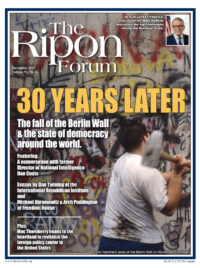
Each generation has pivotal moments that help define them. For many Americans over the age of forty, one such event was the fall of the Berlin Wall. It marked the resolution of a 50-year Cold War and the demise of the Soviet Union, an epic geopolitical occasion to say the least. Yet, thirty years later, it’s apparent that for Millennials and Generation Z, it’s just another page in the history books.
Ask nearly any American under the age of 38 what experiences they see as the most influential on the upbringing of their generation and you’ll hear: 9/11, the War on Terror, and the Great Recession. As a result, we have a cohort of Americans that are skeptical of the norms other generations readily accepted and resentful that their elders seem indifferent on the unique challenges they now face. There is a growing level of fatigue among today’s youth with the status quo, and that means more frequent calls for sweeping change.
Today’s high school curriculum incorporates Reagan’s iconic speech where he commanded “tear down this wall” as part of post-Cold War American history units, but there is not much evidence to suggest that the fall of the Berlin Wall is exceptionally significant to those who didn’t live through it.
We have a cohort of Americans that are skeptical of the norms other generations readily accepted.
Chris Gueffroy, one of the last victims shot at the Berlin Wall, was 20 years old when he planned his escape from East Germany. When he refused to join the National People’s Army, he was denied a university admission and became increasingly bitter about his educational and career limitations. On February 5, 1989, he and his friend, Christian, came under fire as they ran to attempt to climb the barrier. Gueffroy died at the scene and Christian was sentenced to three years in prison.
In an article from 1988, The New York Times covered a story on unrest among youth in East Germany. “Some young East Germans are organizing groups to trade information on emigration to West Germany. But mainly, what marks the new movements is a desire to stay and change things.” Despite the oppression they faced and the movement among youth at the time to fight against Soviet norms, socialism is making a comeback in modern Germany with the rise of new radical political leaders on the left.
While the fall of Soviet control of East Berlin is not personally relatable for young Americans, it was real life for their German peers – yet sentiment for heightened government involvement is spreading in both countries. Here in the United States, 70% of Gen Z (ages 14-22) agrees with the statement “government should do more to solve problems” compared to 49% of the Boomer generation.
For those too young to remember, the fall of the Berlin Wall is just another piece of the past.
The movement around “democratic socialism” has gained traction in recent years in American politics, and it has because it goes hand in hand with this growing openness for increased government involvement over businesses and individuals among younger Americans. Whether the policy proposals on the far left are truly socialist or not is up for debate, but it is very clearly a platform centered on skepticism of free markets and championing the centralization of duties and power to the federal government.
For those too young to remember, the fall of the Berlin Wall is just another piece of the past—right up there with the Vietnam War, Moon landing, and the attack on Pearl Harbor. It’s history, but nothing personal. This is important to know if you want to better understand young Americans and understand what they envision for this country in the coming decades. The demise of the Evil Empire was one of the most significant events of the twentieth century, where members of the Silent Generation, Baby Boomers, and Gen Xers saw the long-awaited resolution of a half century standoff between capitalism and communism. The presence of a communist political rival defined much of the politics of these older generations’ coming of age. But that’s in the past.
New generations are coming of age and are beginning to vote in larger numbers and show their presence electorally. If we are to understand what this means for the future of America, and why a political shift seems to be taking place, take a look at the lives of Millennials and Generation Z and the world they grew up in.
Kyle Chance is the Deputy Editor of The Ripon Forum and Sarah Pearce is an Editorial Intern for the Forum.




